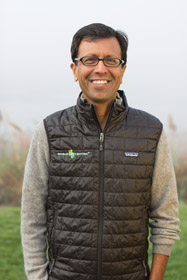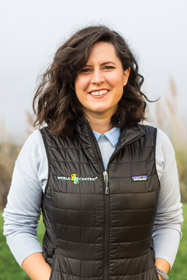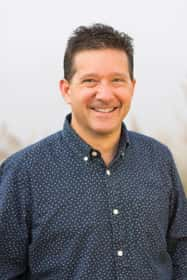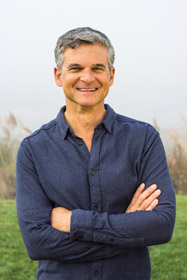
After working for many years in computer science with a focus on knowledge-based systems, including a few years developing artificial intelligence at the NASA Ames Research Center in Silicon Valley, Aseem Das made a career change 14 years ago. “After NASA Ames, I worked in a few companies, but was still searching for what would be personally meaningful to me, which is to have my work be about social and  environmental issues,” he says.
environmental issues,” he says.
In 2004, this led to Das founding World Centric, a nonprofit to raise awareness of social and environmental issues and the impact of our everyday choices on these issues. As a way to support the educational mission, World Centric started to promote and sell compostable food service products in 2005. Sales of products organically grew over time and by 2009 had become the main activity at which time, World Centric converted to become a for-profit. The native of India currently serves as its chief executive officer and visionary.
Today, World Centric is headquartered in Petaluma, with 44 employees across the nation. It has developed approximately 250 foodservice and tableware products that are 100 percent compostable and manufactured from plant-based materials—earth-friendly alternatives to Styrofoam (polystyrene foam) and wood-based single-use products coated with petroleum-based plastic.
According to a World Centric press release, the company explains that it “provides zero waste solutions for the foodservice industry to reduce environmental impact…when these items are commercially composted, they turn into soil within two to four months, thus completing a full closed loop for the plant material.”
These plant-based fibers are a renewable resource and nontoxic, and turning them into compostable products requires less energy than making Styrofoam products. “The transition away from petroleum-based plastic and foodware products is changing rapidly,” explains Mark Marinozzi, World Centric’s vice president of marketing. “Many petroleum plastic food service products can now be made with plant-based materials, and plant-based materials can also often replace tree-based paper products.”
Partnerships and plants
World Centric manufactures its plates, bowls, cups, paper towels, napkins, utensils, drinking straws, trays, and clamshell take-out containers from plant-based material such as discarded wheat straw, bamboo fiber, sugarcane fiber and after juice extraction, silver grass, corn resin and starch.
According to Das, 90 percent of the manufacturing takes place in Asia and 10 percent in the U.S. The company warehouses its products in San Leandro and Columbus, OH.
“We’ve looked at domestic manufacturing, but capital costs are high and we feel it’s better to partner with other manufacturers to make our products based on our specific designs. They have many years of experience in manufacturing and understand the complexities and issues. We do all the design work and own all the custom tooling needed for our products,” says Das. “Similarly for warehousing and order fulfillment, we partner with companies who focus on warehousing, storage and fulfillment. It’s a very lean model of running a business.”
Silver grass can be grown in poor soils in places such as Ohio and northwestern Pennsylvania, where some farmers have overtaxed their fields from years of growing soybeans and corn. “Silver grass is providing these farmers with an additional revenue stream,” says Marinozzi. “It’s drought tolerant and an efficient carbon-capturing plant. Even with all the harvesting and processing, silver grass captures as much or more carbon, than is used to manufacture the products. We make some of our clamshell containers from silver grass—and other containers, plates and bowls with unbleached plant fibers such as wheat straw and sugarcane bagasse. ”
The company recently debuted a box called the PizzaRound, which is being marketed to pizza take-out and delivery restaurants. Made of 80 percent sugarcane and 20 percent bamboo, PizzaRound is currently available in two sizes. The company is also now preparing to launch its NoTree fully compostable hot cups and bowls in many sizes for the foodservice industry, made from 100 percent sugarcane paper.
“The fiber that’s left over from making sugar from juice mostly gets burned or landfilled, and we’re using that fiber for a sustainable use,” says Das. “We believe this is the first 100 percent sugarcane paper cup ever produced. We are continually looking at possible new materials, which are more sustainable and can reduce the impact on the environment,” says Das.
Solving world’s challenges
World Centric isn’t only making products that are rapidly growing in popularity and increasing its bottom line. It also donates at least 25 percent of its net pre-tax profits every year to under-the-radar organizations that are addressing social and environmental issues worldwide. “As a company, we’ve pledged to give at least 25 percent of our profits to grassroots social and environmental organizations. Much of the donations go to organizations working to bring basic human needs solutions,” says Das. “As the company has grown and our profits have increased, one part of our mission has been to bring basic human needs solutions—such as housing, clean water, sanitation and medical care—to those who have less than we do,” says Das.
 World Centric chooses to work with small nonprofits that are implementing solutions to fulfill these basic needs, explains Janae Lloyd, the company’s organizational development manager. “That’s our approach to addressing some of the world’s most challenging problems. Ideally, these organizations’ projects have multiple impact areas, such as advancing their environmental work along with making social and economic changes. We look at the actual work the nonprofit is doing and how they run themselves as an efficient organization.”
World Centric chooses to work with small nonprofits that are implementing solutions to fulfill these basic needs, explains Janae Lloyd, the company’s organizational development manager. “That’s our approach to addressing some of the world’s most challenging problems. Ideally, these organizations’ projects have multiple impact areas, such as advancing their environmental work along with making social and economic changes. We look at the actual work the nonprofit is doing and how they run themselves as an efficient organization.”
They tend to be scrappy grassroots groups, says Marinozzi, “with lean infrastructures that are making an impact through providing economic development assistance and creating change at the root of the issues.”
Last year, World Centric donated $1.24 million from its profits in cash and product donations to help fund humanitarian and environmental projects in Africa, India, Central America, and other regions of the world. (See sidebar, “Betterig Both Worlds”). In fiscal year 2016, the company donated $680,000.
It also generously donates compostable foodware products for school fundraisers and other events, accounting for approximately 100 donations annually. Following last summer’s devastating hurricane in Puerto Rico, World Centric sent a shipment of its products—plates, cups, utensils and more—to help relief agencies feed thousands of people in the disaster’s aftermath.
Seeking new markets
 As senior vice president of sales for World Centric, Mark Stephany’s job is to find new channels and segments for its compostable products. In June 2018, World Centric’s retail products were added to nearly 200 Target stores nationwide. “We’re excited to begin a partnership with Target, to be on shelf with one of the country’s premier retailers. If we perform well with their consumers we have the opportunity to expand to all 1800 Target stores. In addition, you can find World Centric products on shelf at Whole Foods Markets nationally, and we’re in a select group of 17 Costco business centers that appeal to small businesses.”
As senior vice president of sales for World Centric, Mark Stephany’s job is to find new channels and segments for its compostable products. In June 2018, World Centric’s retail products were added to nearly 200 Target stores nationwide. “We’re excited to begin a partnership with Target, to be on shelf with one of the country’s premier retailers. If we perform well with their consumers we have the opportunity to expand to all 1800 Target stores. In addition, you can find World Centric products on shelf at Whole Foods Markets nationally, and we’re in a select group of 17 Costco business centers that appeal to small businesses.”
In addition to the growing consumer market, World Centric supplies foodservice operations across the U.S. in numerous colleges and universities, hospitals, and for large business and industry accounts. It supplies compostable products to the Bay Area campuses of technology titans Facebook, Google, Apple and Tesla, who serve food to thousands of employees and visitors every day. “These progressive companies are in tune to responsible packaging as part of their corporate sustainability commitment. Their employees are educated to the impact. They ‘walk the talk’ by using sustainable products, and in many cases are diverting landfill trash by composting food and packaging waste,” he says.
Colleges and universities are a leading market segment for World Centric, because students care about the environment and the future of the planet, he explains. “The students drive momentum on campus to make the right choices in packaging and to push toward zero landfill waste. We’re now beginning to see some K-12 school districts transition to compostables. Millennials parents with school-age children are vocal and putting pressure on school officials to make the change. They don’t want their kids eating on petroleum-based products that are known to leach chemicals, and schools see it as a teaching moment.”
World Centric is also growing its health-care sector. “Acute care hospitals, many of which are challenged in their budgets, are making the move to plant-based packaging. It would appear that doctors and health-care workers are concerned about the toxicity of traditional, petroleum-based plastics and hospital administrators are reacting,” he says.
Styrofoam, he adds, is also still used by many grocery stores for their packaged meats and produce. “So, that’s another segment of the market we’re looking at. Consumers are rejecting polystyrene broadly.”
Whether it’s a restaurant chain or a large hospital, businesses are choosing to pay a bit more for compostable food packaging because they strongly believe their customers care and are demanding responsible packaging, says Stephany. “We’re seeing a shift, and many consumers’ mindsets are moving beyond the quality and attributes of the food they consume, whether organic, locally sourced or GMO-free,” says Stephany. “Consumer awareness has expanded to the vast amount of waste that ends up in landfills and oceans. Compostable packaging is part of the solution, whereby our plant-based packaging can turn to soil in two to four months in a commercial compost facility. We have the opportunity—arguably a responsibility to make educated decisions that impact the planet and its people.”
Double-digit growth
Because of this shift in consumer behavior, the market for compostable products is booming. Growth in the foodservice sector itself hovers at 3 to 4 percent annually, while the compostables industry is increasing by 15 to 18 percent each year. “Businesses want to show their concern to consumers that they are doing the right thing by offering compostable products,” says Das. “If you still get a Styrofoam container from a restaurant, it potentially looks bad for that business. There’s also increasing legislation around the nation to ban the use of Styrofoam, so that’s also driving a lot of new business to the compostables industry.”
According to Stephany, every bit of Styrofoam ever produced since it was introduced six decades ago is still on the planet. “It will take hundreds of years to break down [Styrofoam], and there’s risk to our food supply as pieces are consumed by marine life and the toxicity is ultimately passed along,” he says.
 Demand for foodware compostables in the U.S. is projected to reach $22 billion in sales in 2019, says Marinozzi. “Much of that growth is in limited service restaurants—from quick service restaurants like McDonalds, to fast-casual operations like Chipotle and Panera—with corporate social responsibility teams that are putting the thumbscrews on their supply chain and suppliers,” he says. “I predict 80 percent of the compostable tableware sales will come from these types of restaurants. They need to do a better job of providing alternatives to single-use packaging, and their suppliers are responding.”
Demand for foodware compostables in the U.S. is projected to reach $22 billion in sales in 2019, says Marinozzi. “Much of that growth is in limited service restaurants—from quick service restaurants like McDonalds, to fast-casual operations like Chipotle and Panera—with corporate social responsibility teams that are putting the thumbscrews on their supply chain and suppliers,” he says. “I predict 80 percent of the compostable tableware sales will come from these types of restaurants. They need to do a better job of providing alternatives to single-use packaging, and their suppliers are responding.”
One of World Centric’s biggest challenges, according to Marinozzi, is elevating trade and consumer awareness of how best to keep its products from ending up in landfills and what options for composting are available in areas where World Centric products are used.
“We just hired a sustainability manager who will research and develop resources for us to better communicate end-of-life options for our compostable products. Our primary goal is to uphold and expand our commitment to environmental sustainability across the U.S. and beyond.”
Company culture
Das was forced to find a new location for World Centric in 2013 when the Palo Alto building the company occupied was slated for demolition. “We had a couple of employees who had grown up in Sonoma County, and recommended that it was really nice area to live and work. I toured a few places here and liked the slower pace and the high quality of life,” he says.
Headquartered in the Foundry Wharf office and warehouse complex in Petaluma, World Centric has 28 employees working locally.
Lloyd says the company’s culture is constantly evolving. “Our values are community, integrity and excellence in how we do business and interact with each other. World Centric fosters an encouraging and caring environment, and we exist to serve people and planet through our products and impact projects. You will find that we have never chased profits; purpose has always come first.”
In March, Lloyd was among a group of five World Centric employees who traveled to Haiti to visit three of their nonprofit partners whose work includes building composting toilets, reforestation work, and education for impoverished children. Each quarter, the company volunteers as a team to also help out local organizations, such as Friends of the Petaluma River and Daily Acts.
Das says he wants to connect his staff to the giving projects they donate to around the world. “We try to make it a part of their day-to-day work lives. We frequently bring in speakers from the organizations we have donated to so the staff has a first-hand look of how those giving projects are helping people. And in the future, we hope to have more of these direct trips by our employees to where we are donating, such as the recent visit to Haiti. Sometimes we just don’t realize how the rest of the world is living.”
B Corporation Certification
World Centric has been a Certified B Corporation for eight years, and was recently recertified. For 2018, it has been ranked as a Best for the World nominee, meaning it ranks in the top 10 percent of B Corporations worldwide.
The company is among a small group of companies worldwide that meet rigorous standards of social and environmental performance, accountability and transparency as measured by B Lab’s Certified B Corporations program.
B Lab is a nonprofit organization dedicated to using the power of business to help drive systemic social and environmental change through several initiatives. The first is to build a community of Certified B Corporations “to make it easier to tell the difference between ‘good companies’ and just good marketing,” according to the organization.
Currently there are 2,504 B Corporations in 50 nations representing 130 different industries, and comprising a diverse multi-billion-dollar marketplace. Headquartered in Pennsylvania, B Lab operates offices in New York City, Denver and San Francisco.
Bettering Both Worlds
 Following is a partial list of organizations and their projects that recently received funding from World Centric, using a portion of its 2017 profits.
Following is a partial list of organizations and their projects that recently received funding from World Centric, using a portion of its 2017 profits.
• One project led by Aid Africa will bring clean water to as many as 10,000 Ugandans every day. The organization builds shallow wells using traditional techniques, creates sheltered springs to enable communities to tap into safe natural resources, and repairs broken wells. Another Aid Africa project provides 1,500 fuel-efficient, low-emission cooking stoves to families in rural communities of northern Uganda, where traditional cooking over wood fires creates severe air pollution and its related health problems.
Also in Uganda, Aid Africa is planting fruit trees to provide families with both nutrition and income that helps to pay for school fees. Additional planted trees supply fuel for cooking and poles for roofing. Firewood gathering by Ugandan women, who are sometimes forced to stray far from home, exposes them to “firewood rape.” Through this project, as many as 1,250 households will receive four firewood trees and four fruit trees.
• DESPRI (Development Entreprenariat Social Production Rural Intègre) is planting hundreds of thousands of tree seedlings in northwestern Haiti through six community-managed tree nurseries. This region of Haiti suffers from high rates of environmental degradation, soil erosion, deforestation, drought, and falling water tables. In addition, DESPRI’s Women’s and Girls Empowerment and Leadership project is providing microloans to Haitian women to increase their leadership capabilities and economic self-sufficiency.
• Pediatric HIV care is being provided to hundreds of children by the Power of Love Foundation, along with a microloan program for women impacted by HIV in Zambia. Another project provides 5,000 insecticide-treated nets for battling disease-carrying mosquitoes.
• Rainforest Action Network has multiple projects worldwide helping to combat climate change by supporting frontline communities that are directly challenging the fossil fuel industry.
• SHRI (Sanitation and Health Rights in India) brings access to toilets and safe drinking water for more than 1,500 women, men and children in Supaul, Bihar, India. As many as 600 million people in India defecate in the open and lack access to safe drinking water. As a result, 12 million new cases of illness are recorded each year, along with hundreds of thousands of preventable deaths. SHRI constructs community toilet blocks in rural Indian villages; the waste is collected in a large underground tank constructed onsite, where it decomposes to produce methane gas, an energy source used to power an onsite water filtration plant.
• The nonprofit organization SOIL is leading a project to promote dignity, health and sustainable livelihoods through the transformation of wastes into resources in Haiti. Only 30 percent of Haitians have access to sanitation, and less than 1 percent of wastes are safely treated. This creates contamination of the water supply, which has fueled one of the most virulent cholera epidemics in recent history. The SOIL project safely converts human waste into 100 metric tons of compost each year, transforming a public health problem into an environmental solution.
• Because Haiti is the poorest nation in the western hemisphere, the majority of its citizens lack access to quality education. Challenges in funding, teacher training and access remain widespread. SOPUDEP, a Haitian grassroots social organization, provides 800 children with a high-quality education and a hot meal every day.
• Trees, Water & People is improving lives by helping communities preserve, conserve and manage their natural resources, such as in El Salvador, which has the second highest deforestation rate in Central America. More than 80 percent of its forests have disappeared since the 1960s. With World Centric’s funding support, TW&P expanded its tree nursery to 40,000 trees. This year’s World Centric funds will help maintain grow levels at the nursery and go toward the purchase of seeds.
Author
-

Jean Doppenberg is a lifelong journalist and the author of three guidebooks to Wine Country.
View all posts




